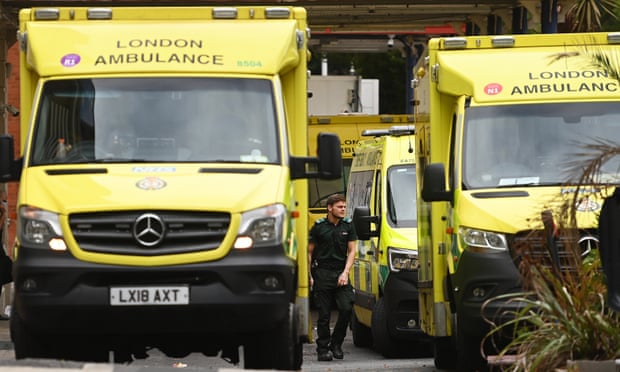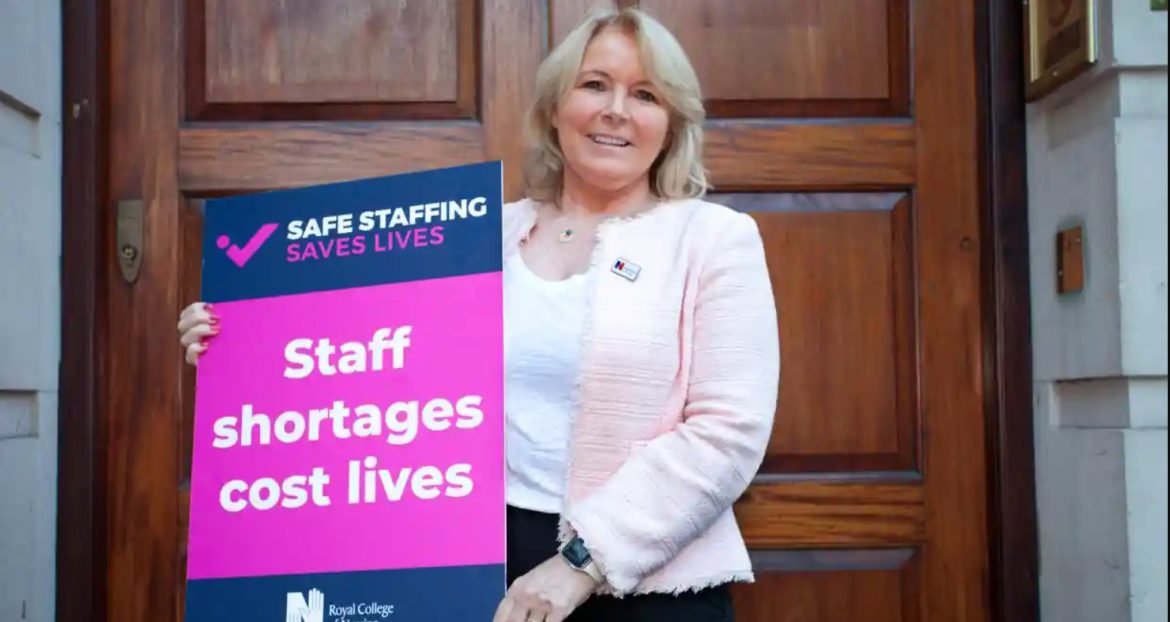Low-paid workforce could leave the profession in droves, with very survival of health service at risk
Nurses will vote to go on a national strike for the first time in their history because the NHS has “gone over the precipice” and may not survive, the leader of the UK’s largest nursing union has told the Observer.
Pat Cullen, general secretary of the Royal College of Nursing (RCN), said there is anger among nurses, who feel that ministers do not believe they are important.
In an exclusive interview with the Observer before the ballot on industrial action, Cullen recalled a conversation with frontline staff at a major hospital: “They said to me, ‘We’re not important to the government. We were seen as important during the pandemic, but we’re not important now. We don’t think the government will do anything for us’.
“When I talked to them about being a demoralised workforce, they said: ‘we’re not just a demoralised workforce. We have given up. No one seems to care any longer.’ There is an anger that they have been pushed to this position.
“We need to step up and look after these nurses. If we don’t, it’s scary to think about what will happen. The health service is not just staring over the precipice. It has gone over. And the very people who are trying to bring it back up are being paid the lowest wage we can possibly pay them. If we deplete it any further, there will not be a health service there.”
Cullen has toured the country, speaking to hundreds of nurses in the past few weeks about whether the RCN, which represents nearly 500,000 nurses, midwives and support workers, should go on strike.
An NHS nurse’s starting salary is £27,055 – for support staff also represented by the RCN, such as healthcare assistants, it is £20,270 – and the RCN estimated last year that the average nurse’s salary was £35,340, including extra shifts and on-call payments. The RCN decided to ballot after the government unilaterally gave NHS nurses a £1,400 pay rise, leaving them £1,000 a year worse off in real terms, according to the union. It wants a rise of 5% above inflation to avoid a flood of nurses leaving the profession.
The ballot was due to open on Thursday but was postponed after the death of the Queen, who was the RCN’s royal patron.
“It is probably the most difficult it has ever been for every single nurse – even more challenging and difficult now than it was through the pandemic,” Cullen said, speaking before the Queen’s death was announced. “And I think it’s quite a frightening place for our nursing staff because of the absolutely depleted workforces.”
Nurses are caring for patients with highly complex needs, she said, particularly older patients who have been waiting for surgery for years. At the same time, many nurses find themselves having to use food banks, and can’t afford to cook hot meals or buy school uniforms for their children.
Last week, NHS England said 6.8 million people were now waiting for treatment, a record high, with 377,689 waiting for more than a year. Ambulance waiting times have shot up, with only 58% of patients seen within four hours, far below the 95% target. A man died in an ambulance outside Norfolk and Norwich University Hospital on 22 August while waiting to be admitted, because there were no beds available.
Some patients who are medically fit to leave hospital have waited nine months because there is no social care available for them. Thérèse Coffey, the new health secretary, has said her “ABCD” priorities are ambulances; backlogs; care; and doctors and dentists, while prime minister Liz Truss put “delivering on the NHS” as one of her top three priorities.

Cullen became general secretary in July last year, having been director of RCN Northern Ireland. She has been a nurse for 42 years: for much of that time she worked as a nurse psychotherapist in Northern Ireland’s prisons, and principally with victims of the Troubles.
She is confident she can lead a successful strike. The union has a £50m hardship fund for striking staff whose pay is docked – members of the public have already offered donations as well – and she speaks strongly of nurses’ resolve. She also has some practice in industrial disputes, having successfully led a strike in Northern Ireland in 2019.
Nurses there were paid less than in the rest of the UK, but a row between Sinn Fein and the DUP over the Cash for Ash scandal meant there was no Stormont administration to negotiate with. In December 2019, the RCN went on strike. By mid-January, Sinn Fein and the DUP were in talks, and by the end of the month, nurses had been given a £109m pay deal.
“Very quickly we had an assembly re-established and a new executive formed,” Cullen said. “It’s well documented that was a consequence of those nurses saying ‘enough is enough, you need to get back to your work’.”
On the larger stage, Cullen is anticipating a tougher fight, with Britain facing a wave of industrial action as unions try to ensure their members do not lose out as inflation rises above 10%. Rail workers, train drivers, postal workers, bus drivers, council workers, exam board staff, academics, barristers, court staff, teachers, journalists, firefighters and doctors have all taken action or are set to ballot.
Cullen said she talks regularly to other union leaders, although the RCN is not affiliated to the TUC. Although she is unlikely to get the media treatment meted out to RMT leader Mick Lynch, Cullen said she was prepared. “[Newspapers] can dig away at me but I’m a very boring person,” she said. “I’ve been a nurse for 42 years. I’ve been married for 32 years. I spend most of my weekends still nursing. And when I’m not doing that I have the pleasure of looking after my mother-in-law, who needs a lot of care after a stroke.”
Keir Starmer has told Labour MPs not to join picket lines, and Cullen is not expecting particular support from the party for the strike.
“It’s entirely up to them. What I would suggest is that no politician should turn their back on any nurse. If they turn their back on nurses during what will be a very, very challenging time for nurses – if we move to strike – those 500,000 nurses will not forget that, and I think patients will have something to say.”
And if the government believes it can out-wait the RCN, or take them on, Cullen has a warning.
“If the government thinks of trying to set the public against nursing, I’d tell them not to bother,” she said. “The public are smarter than that.”
Source:- https://www.theguardian.com/society/2022/sep/11/nhs-is-over-the-precipice-warns-nurses-leader-as-strike-vote-looms


